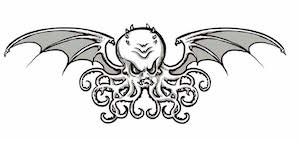
SPIDERSONG

SPIDERSONG
We listen to the spidersong. The spiders are far away, just at the edge of our senses, whispering a haunting and beautiful melody into our minds. The grown-ups are oblivious, as always. They are having several conversations at once around the campfire, laughing and gossiping. It’s a nuisance because we can’t enjoy the spidersong nearly as well, not with all the distractions. We use a reliable trick—we have Sheila ask for a story.
Sheila is the youngest and she hates to speak using words even more than the rest of us, but we nudge her along, and she tugs on old Jens’ coat. He is only too happy to oblige. Kids and grown-ups alike gather around the fire. Everyone else quiets down and settles in to listen to Jens.
“What story would you like, dear,” asks Jens. “Do you want to hear about the home world, or about our voyage among the stars?”
“Nah, that stuff’s boring,” says Sheila. “Tell us about the spiders.”
Jens frowns. The grown-ups don’t like the spiders at all. But Sheila looks pleadingly up at Jens with big hazel eyes and he surrenders.
“When our ship crashed nineteen years ago, things were real bad. We had very little food and supplies and only a vague idea about how to live off the land. There were many problems and dangers to overcome, but the spiders—they were the worst.”
Some of the grown-ups shift uncomfortably. They stare past the silk-covered trees at the edge of the clearing and into the darkness of the forest, fearing an ambush. We know there are no spiders lurking nearby; their song is still very far away.
“The spiders of this world were the scariest creatures we’ve ever encountered,” Jens says. “They were fast, deadly and huge—three times the size of a man. Too much for us to handle. We lost seven people in two months and had no choice but to abandon the original camp and move further away from the forest.”
Eva, the eldest of the children, shares her memory of the crash site. It’s all corroded metal and scorched ground—an uncomfortable, almost alien place. We break away from the image and take solace in the spidersong, which is a little louder now and very soothing.
“Years went by, and the rescue we had hoped for never came. We made a life for ourselves in the relative safety of the plains. But our fledgling colony needed the forest—we gathered plants, hunted game and collected spider silk, despite the danger.”
Kyle caresses his spider silk sweater. It’s very rugged, but soft and warm, and all of us like how it feels against Kyle’s fingertips.
“Life was very tough for us back then. We sent hunting parties into the forest to get what we needed, but the spiders hunted us in turn. Not a year went by without us losing at least one person to the bugs. It was bad, until the children began to grow up. Until we realized that those born on this planet could sense the spiders somehow, from a distance.”
Eva and Kyle share a memory from when they were very little. In it they walk past the silk-covered trees to fill a bucket of water from the nearby lake. Suddenly, a spider emerges—far from the deep forest its kind inhabits. Eva and Kyle are terrified. The spider looms over them, but it doesn’t attack. Instead, it prods and probes at their thoughts. Then it fills their heads with music. Fear evaporates. They are mesmerized by the melody. Clumsily, the children sing back. For several minutes the spider listens patiently to their attempts, and then retreats gracefully toward the trees.
Jens pats Sheila on the head. “We don’t know what it is that makes you kids born on this world different, but we are thankful anyhow. This is why we bring kids on every hunting trip now. You can tell us when the spiders are coming. We haven’t lost a single person in the last few years.”
Safe and comfortable by the fire the grown-ups are nodding off. Jens continues to tell stories, but they are only noise. We listen to the spidersong. It is loud now, a chorus from many spiders who are gathering, dozens of them drawing nearer and surrounding the camp. The spiders are aware of us, and we of them. We aren’t afraid. We are both of this world, the spiders and us. Just like the spiders we are a hive—able to share thoughts and emotions, and be close with each other in a way our parents could never understand. It’s only the adults—the intruders, the aliens whose minds are mute—that the spiders hate.
The spiders are singing a war song. It is full of joy, anticipation of victory and demise of their enemies. We sing back to the spiders with our minds, strong and confident this time, our thoughts in full harmony with theirs.
They are almost here.
This story originally appeared at Daily Science Fiction. The audio of it was also produced by the Drabblecast. It’s the only story to date I’ve managed to write in plural first person present tense.
Like so many of my shorter stories, this was written for a contest. The prompt was a selection of photographs of spiderweb-enshrouded trees from National Geographic. Heavy flooding in Pakistan had caused thousands of spiders to escape the rising water into the trees and make their homes there. But those were just regular spiders, and where is the fun in that?